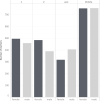Knowledge syntheses in medical education: Meta-research examining author gender, geographic location, and institutional affiliation
- PMID: 34699558
- PMCID: PMC8547645
- DOI: 10.1371/journal.pone.0258925
Knowledge syntheses in medical education: Meta-research examining author gender, geographic location, and institutional affiliation
Abstract
Introduction: Authors of knowledge syntheses make many subjective decisions during their review process. Those decisions, which are guided in part by author characteristics, can impact the conduct and conclusions of knowledge syntheses, which assimilate much of the evidence base in medical education. To better understand the evidence base, this study describes the characteristics of knowledge synthesis authors, focusing on gender, geography, and institution.
Methods: In 2020, the authors conducted meta-research to examine authors of 963 knowledge syntheses published between 1999 and 2019 in 14 core medical education journals.
Results: The authors identified 4,110 manuscript authors across all authorship positions. On average there were 4.3 authors per knowledge synthesis (SD = 2.51, Median = 4, Range = 1-22); 79 knowledge syntheses (8%) were single-author publications. Over time, the average number of authors per synthesis increased (M = 1.80 in 1999; M = 5.34 in 2019). Knowledge syntheses were authored by slightly more females (n = 2047; 50.5%) than males (n = 2005; 49.5%) across all author positions. Authors listed affiliations in 58 countries, and 58 knowledge syntheses (6%) included authors from low- or middle-income countries. Authors from the United States (n = 366; 38%), Canada (n = 233; 24%), and the United Kingdom (n = 180; 19%) published the most knowledge syntheses. Authors listed affiliation at 617 unique institutions, and first authors represented 362 unique institutions with greatest representation from University of Toronto (n = 55, 6%). Across all authorship positions, the large majority of knowledge syntheses (n = 753; 78%) included authors from institutions ranked in the top 200 globally.
Conclusion: Knowledge synthesis author teams have grown over the past 20 years, and while there is near gender parity across all author positions, authorship has been dominated by North American researchers located at highly ranked institutions. This suggests a potential overrepresentation of certain authors with particular characteristics, which may impact the conduct and conclusions of medical education knowledge syntheses.
Conflict of interest statement
The authors have declared that no competing interests exist.
Figures




References
MeSH terms
LinkOut - more resources
Full Text Sources
Miscellaneous

